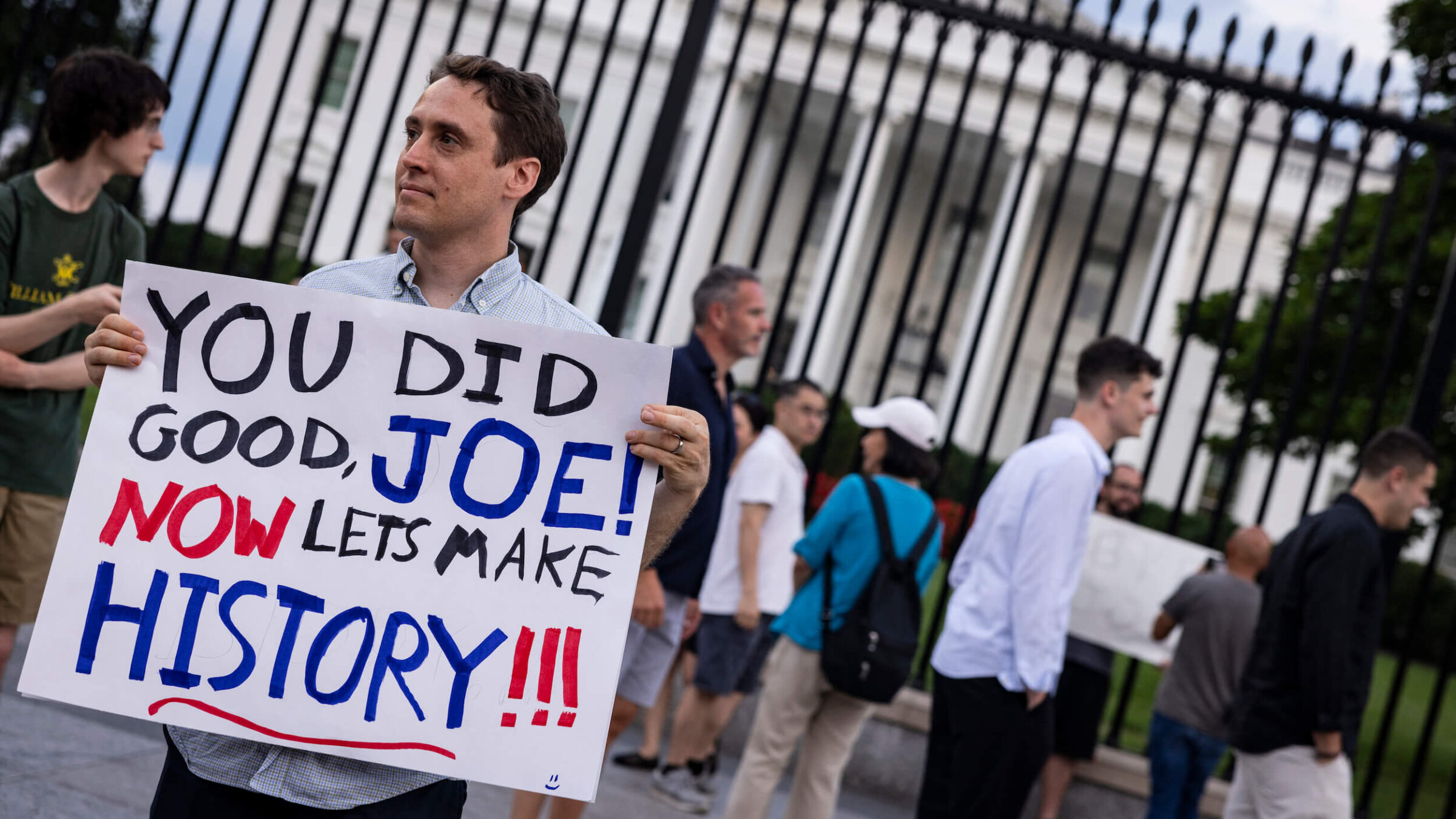Biden’s ‘West Wing’ moment, and its profound Talmudic resonance
After looking at the numbers, the president finally decided he was satisfied with his portion

A man holds a sign showing his appreciation for President Joe Biden in front of the White House after Biden announced he would drop out of the presidential election and endorsed Vice President Kamala Harris as a candidate for the Democratic Party’s new nominee. Photo by Samuel Corum/AFP/Getty Images
As I read and reread President Joe Biden’s history-busting and heroic letter announcing his withdrawal from the presidential race on Sunday, my heart and head filled with thoughts of two other men I admire, men who helped shape my Jewish identity and my political outlook.
I’m talking, of course, about my late father and Aaron Sorkin’s fictional leader of the free world, Jed Bartlet.
At my dad’s funeral 18 months ago, his rabbi, Benji Samuels, invoked a line from Pirkei Avot, or Ethics of the Fathers, that great Talmudic collection of aphorisms: “Who is rich? The person who is satisfied with their portion.”
At the end of Season 2 of The West Wing, as President Bartlet deliberates over whether to seek reelection after disclosing that he had multiple sclerosis and didn’t tell anyone, he is guided by a simple mantra: Show me numbers.
On Sunday, after looking at the numbers, President Biden finally was satisfied with his portion.
He took longer than I would have liked to come to the right conclusion — for Democrats, for democracy and for his own legacy. But it’s deeply honorable that he reached that conclusion at all. His letter showcased the humility embodied in the aphorism from Pirkei Avot.
“I believe it is in the best interest of my party and the country for me to stand down,” he wrote, “and to focus solely on fulfilling my duties as president for the remainder of my term.”
Biden’s “portion” — 36 years in the United States Senate, eight as vice president and an unlikely topper of a term as commander in chief — was unimaginably larger than he could have dared dream as a boy with a stutter growing up in hardscrabble Scranton, Pennsylvania.
In stepping aside, even at this late hour, Biden takes the high road that Supreme Court Justice Ruth Bader Ginsberg rejected, to disastrous results. And that brave, selfless move will allow us to remember and honor him for his achievements, rather than risk the first line of his obituary focusing on his stubborn insistence on losing to former President Donald Trump.
Those achievements include steadfast support for Israel’s right to exist as a Jewish state, and groundbreaking leadership on antisemitism.
The political chaos of the past few weeks was a dangerous distraction from the war in Gaza. Now, with the freedom of a lame duck, Biden has a unique opportunity to take every political risk to pressure Israel and Hamas to reach a ceasefire deal that frees the remaining hostages, ends the fighting, and pursues a longterm peace through the only possible path — two states for two indigenous peoples between the river and the sea.
In my father’s final few years, his frailty sometimes frustrated us. He stepped back or sat out things he’d long loved, once even saying, “I’ve had enough Thanksgivings.” On what we did not then know would be his last family beach vacation, he explained that he now had to pick his shots.
I didn’t get it until the funeral; this was dad being satisfied with his portion.
In the days, weeks and now many months since his death, my memories of the difficult days defined by dad’s limitations have faded. Instead, my mind’s eye sees him at his most vital and vibrant: teaching his grandchildren about the Seder plate, hosting meals in his Sukkah, helping build a synagogue from scratch.
In the coming weeks and months, we can similarly replace our painful memories of Biden’s terrifying, blank stare during the debate with a highlight reel of his strongest moments. When he, in announcing his candidacy for president in the 2020 election, forcefully condemned Trump’s defense of the “very fine people” who chanted “Jews will not replace us” in Charlottesville. His creation of the first national strategy to counter antisemitism. And, less than two weeks after Oct. 7, his solidarity trip to Tel Aviv, the first time a sitting president visited Israel during wartime.
My beloved President Bartlet, as West Wing fans know, made a different decision than Biden. The situation was also starkly different: Bartlet had a political problem, having failed to disclose his disease; he was not (yet) significantly weakened by it, as Biden increasingly appears to be by his age.
This weekend I went to see a special exhibit celebrating the 25th anniversary of The West Wing at The Paley Center for Media in Manhattan. It was eerie, while there, to rewatch “Two Cathedrals,” the episode in which Bartlet is deciding whether to drop out, knowing the same deliberations were underway at Biden’s beach house.
It is a brilliant episode of television, with a stirring monologue in which Bartlet speaks directly to God, partly in Latin. He decides to bow out — and then changes his mind when the ghost of his longtime assistant has him run the numbers. He decides he must run for reelection because of the 44 million Americans without health insurance, the 13 million children in poverty, 3 million incarcerated, “to say nothing of 53 people trapped in an embassy.” (In Haiti. A minor plot point, really.)
Biden did not include numbers in his Sunday letter, but he did cite the significant accomplishments of his administration.
“Today, America has the strongest economy in the world,” he wrote. “We’ve made historic investments in rebuilding our nation, in lowering prescription drug costs for seniors, and in expanding affordable health care to a record number of Americans. We’ve provided critically needed care to a million veterans exposed to toxic substances. Passed the first gun safety law in 30 years.
“Appointed the first African American woman to the Supreme Court,” Biden continued. “And passed the most significant climate legislation in the history of the world.”
Biden also had to confront another set of numbers: poll numbers that showed it would be all but impossible for him to beat Trump in November. Those numbers also say Vice President Kamala Harris, whom Biden heartily endorsed as he exited, has a far better shot, especially if she makes a smart strategic choice for a running mate, like the Jewish governor of must-win Pennsylvania, Josh Shapiro.
Harris, by the way, is also a student of Pirkei Avot. At the Rosh Hashanah reception I attended at her residence in 2022, she quoted another of its famous aphorisms: “It is not your duty to finish the work, but neither are you at liberty to neglect it.”
“This is one of those times in the history of our country and the world, where we are being presented with a wake up call — the blast of the shofar — to challenge ourselves, to ask, ‘What are we doing? What can we do?’” Harris said that muggy evening. “We’re dealing with some very powerful forces that are attempting to wage, I think, a full-on attack against hard-won freedom and liberty, and it is important for us to then be clear-eyed about what is happening and what is at stake, and agree that we can do something about it.”
Back in January, I wrote a column about why a Biden-Trump rematch was bad for the Jews (and everyone else). Mostly I was afraid the whole campaign would retrace the toxic time of 2020, when what we need is a new political dynamic.
Instead, the past month has been one of the most volatile and surprising in the history of American campaigns — from the alarming debate to an assassination attempt on Trump to Biden’s unprecedented choice to step aside. This is, actually, good for the Jews (and everyone else).
Whether Harris is essentially anointed, or a new nominee is chosen through some to-be-determined process leading up to an open Democratic Convention — see: West Wing, Season 6, episode 22, “2162 Votes” — the coming weeks and months promise the most dramatic campaign in memory. Drama draws attention, which is good for democracy.
Rabbi Sorkin could hardly have scripted it better.





















